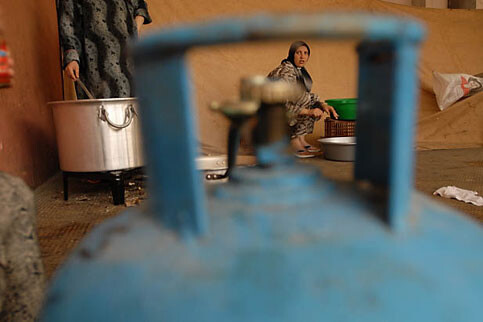United Nations High Commissioner for Refugees 24 July 2006

Displaced women prepare a meal in the Bourj Hammoud High School (UNHCR/C. Lau)
U.N. High Commissioner for Refugees Antonio Guterres said Monday that his agency is positioning more than 500 tonnes of relief supplies along the Syria-Lebanon border but urgently needs assurances of safe passage to deliver the much-needed supplies to tens of thousands of displaced people.
“The plight of the displaced in Lebanon is growing more difficult by the hour and it’s crucial that we get the humanitarian pipeline flowing now,” said Guterres. “UNHCR is trucking some 40 trailers loaded with over 500 tonnes of aid supplies from our regional warehouse in Jordan to Syria. It’s frustrating that we can’t deliver this aid, particularly when there are thousands of uprooted civilians just a few hours away in Lebanon who desperately need it.”
Relief supplies sent so far to Syria include 20,000 mattresses, 20,000 blankets; 5,000 family tents; 5,000 bales of plastic sheeting; 10,000 jerry cans; 5,000 stoves and 5,000 cooking sets. In all, UNHCR’s regional stockpiles in Jordan and Syria contain 250,000 blankets; 50,000 mattresses; 30,000 kitchen sets; 22,000 family tents; 17,000 stoves and other relief items. Additional quantities are also available in stockpiles in Kuwait and Iraq.
“It is absolutely vital to grant the humanitarian community access to these people,” Guterres said. “We have our teams ready to act and we have all kinds of supplies to help them on the border. But we’re unable to bring those supplies to the people who are in such a needy situation.”
The High Commissioner’s comments coincided Monday with a U.N. consolidated appeal for the Lebanon crisis that includes $18.9 million for UNHCR activities aimed at helping 150,000 vulnerable displaced people in Lebanon and neighbouring countries for an initial period of three months. As part of a joint U.N. approach to the crisis, UNHCR will be responsible for protection activities as well as for shelter, site management and provision of non-food aid items.
Its responsibilities include ensuring the physical and material safety of vulnerable refugees and internally displaced people in Lebanon, Syria and surrounding countries, with particular emphasis on women, children and the elderly. UNHCR’s work will also involve border monitoring and facilitating entry for all new arrivals in Syria and ensuring that they are identified, registered and referred to the appropriate organisation for help. Activities will also include mapping of all sites housing internally displaced people; identifying additional accommodation for the displaced; assisting host families who are now caring for tens of thousands of uprooted people; and the provision of humanitarian assistance, including to besieged communities.
The United Nations estimates some 700,000 people have been displaced by the conflict in Lebanon.
In addition to pre-positioning tonnes of relief supplies, UNHCR has sent a 19-member emergency response team comprised of humanitarian specialists who will augment the agency’s current staff in Syria and Lebanon. Members of the team are flying in from UNHCR offices worldwide and should all be on the ground by the end of the week.
UNHCR is setting up a logistics base in Cyprus, but with the agency’s large Middle East stockpiles located in Jordan and Damascus, the land route from Syria to Beirut would be a much faster option.
In Lebanon, UNHCR teams are working with local authorities north of Beirut, assessing the displacement situation and buying supplies, particularly of mattresses, to help ease the strain on those living in public buildings. In the Aley region, there are over 38,000 displaced people living in schools, out of a total displaced population of more than 80,000 who have fled here from elsewhere. Those not accommodated in schools have found shelter with family and friends or are living independently.
“At the schools, people are traumatised and anxious,” said UNHCR’s top official in Lebanon, Arafat Jamal. “The conditions are very precarious. There’s a lot of overcrowding, with people sleeping three families to a room and tremendous pressure on the sanitation facilities.”
Related Links